Synopsis
Framboise Dartigen, the youngest child of Mirabelle Dartigen—a woman still remembered and hated for an incident that happened in the village, Les Laveuses, when Framboise was nine, during the Second World War.
Framboise was profoundly marked by this incident and the events leading up to it. Now a widow of twenty years, she returns to the village on the Loire to restore the family's burnt out farm. She uses her married name, Francoise Simon, as she does not want the villagers to know her real identity. She opens a small restaurant and business is successful. A notable food critic brings it to prominence in a national magazine. This results in a visit from her nephew, Yannick, and his wife, Laure. They are eager to profit from Framboise's sudden popularity. The arrival of Luc threatens the new life she has built for herself.
Framboise, her brother Cassis and her sister Reine-Claude lost their father early. Their mother, Mirabelle Dartigen, was a difficult woman, prone to crippling migraines and more tender with her fruit trees than with her own children. Faced with having to bring up three children and run a farm alone, Mirabelle had to be very tough; sadly, this toughness translated into a lack of outward affection towards her children. When the war came and the Germans occupied Les Laveuses, Mirabelle had to be tougher than ever; the children, with no-one to supervise them, ran wild, eventually falling under the spell of a young German soldier, Tomas, who first bribed them with black-market goods like oranges or chocolate, then manipulated them into secretly giving him information about their friends and neighbours. Framboise, the youngest child, who was nine at the time, and whose relationship with her mother was especially tortuous, became closest to Tomas, and now blames herself for the series of events that resulted in Tomas' death, the retribution killing of ten villagers by the Gestapo and Mirabelle's flight from the family home.
Now, 56 years later, Framboise relives these traumatic events and tries to understand how they have shaped her life and relationships. Eventually, as the truth emerges, she learns how to face down the bullies who threaten her, as well as to forgive herself and her mother, to give herself permission to love, to reconnect with her two estranged daughters and to finally put the past to rest.
Characters
Framboise
The youngest of three, she is most like her mother in spirit. She is defiant, secretive, independent, and tough, often taking the lead with her siblings. She has the maturity and the ruthlessness of a much older child and is used to acting on her own. She is not above lying, stealing or otherwise breaking the rules to get what she wants, and shows as little affection towards her mother as her mother shows to her. She is, however, more sensitive than she would first appear. She barely remembers her father, but misses his influence terribly. This is what initially draws her to the young Tomas Leibniz, who becomes a father-substitute, best friend and elder brother-figure all in one.
The older Framboise has matured into another version of her mother. Repeating the pattern of Mirabelle's behaviour, she finds it hard to express affection for her two daughters, or to rely on anyone. She is prickly, cynical and tough, the toughness hiding the scars of her past, which she still feels keenly.
Tomas Leibniz
The young German officer who becomes friends with the children. He first spots Framboise in the market in Les Laveuses stealing an orange, but doesn't call her on it. Later he's intrigued by her character, and the kids trade information about the people in the village with him for trinkets and magazines. He is an ambivalent character, pursuing his own interests, indifferent to Nazi ideology, unafraid of the negative consequences of his actions. He is a skilled manipulator of people and is not averse to using children to achieve his ends, but he is also kind to Framboise and understands her better than anyone else.
Paul Hourias
Initially a childhood friend of the Dartigen siblings, he drifted away as he remained "on the outside" of their game. He resurfaces when Framboise returns to town, decades later, and helps her to deal and cope with Laure and Yannick's campaign to make her sell them her mother's story. He had been in love with her sister, but now loves her, as he finally confesses at the end of the story.
Mirabelle Dartigen
Framboise, Cassis and Reine's mother. A complicated woman, more at home in the garden or the kitchen than the nursery. She has had to be strong to survive, but her children do not understand how much she genuinely cares for them. She believes in treating children like fruit trees - they benefit from harsh pruning - and so gives them no sign of affection. Instead she expresses her love through cooking - although the children do not understand this. Mirabelle is generally not liked in the village, partly because she does not attend church and partly because for a woman running a farm alone was thought at that time to be slightly indecent. She suffers from terrible headaches, often heralded by the phantom scent of oranges, which cause her to be out of action for days at a time. She keeps a diary among her recipes, written in a secret code.
Cassis Dartigen
The oldest of the children, he misses his father the most, and wants to be the man of the household. But Framboise is the stronger character, and soon takes over leadership of the siblings.
Reine-Claude Dartigen
The middle child, she is the opposite of Framboise. She is very pretty, feminine and biddable, and Mirabelle favours her over Framboise because Framboise reminds her too much of herself.
Yannick Dessanges
Cassis' son. A weak and feckless man, in thrall to his forceful wife, Laure.
Laure Dessanges
Yannick's wife. A ruthless, greedy woman, out to exploit Framboise's reputation and hoping to inherit her money.

Chocolat is a 1999 novel by Joanne Harris. It tells the story of Vianne Rocher, a young single mother, who arrives in the French village of Lansquenet-sous-Tannes at the beginning of Lent with her six-year-old daughter, Anouk. Vianne has arrived to open a chocolaterie—La Céleste Praline—which is on the square opposite the church. During the traditional season of fasting and self-denial she gently changes the lives of the villagers who visit her with a combination of sympathy, subversion and a little magic.

Flowers in the Attic is a 1979 Gothic novel by V. C. Andrews. It is the first book in the Dollanganger Series, and was followed by Petals on the Wind, If There Be Thorns, Seeds of Yesterday, Garden of Shadows, Christopher's Diary: Secrets of Foxworth, Christopher's Diary: Echoes of Dollanganger and Christopher's Diary: Secret Brother. The novel is written in the first-person, from the point of view of Cathy Dollanganger. It was twice adapted into films in 1987 and 2014. The book was extremely popular, selling over forty million copies world-wide.
Madea Goes to Jail is an American musical play, touring from 2005 to 2006, created, written, produced, and directed by Tyler Perry. It stars Tyler Perry as Mabel "Madea" Simmons, Cassi Davis as Ella, Cherly Pepsi Riley as Wanda, and Judy Peterson as Katie.
In psychology, an affectional bond is a type of attachment behavior one individual has for another individual, typically a caregiver for her or his child, in which the two partners tend to remain in proximity to one another. The term was coined and subsequently developed over the course of four decades, from the early 1940s to the late 1970s, by psychologist John Bowlby in his work on attachment theory. The core of the term affectional bond, according to Bowlby, is the attraction one individual has for another individual. The central features of the concept of affectional bonding can be traced to Bowlby's 1958 paper, "The Nature of the Child's Tie to his Mother".
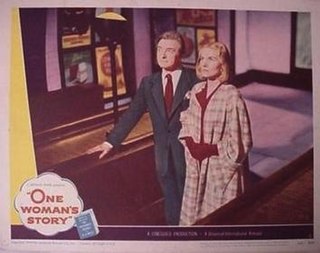
The Passionate Friends is a 1949 British romantic drama film directed by David Lean and starring Ann Todd, Claude Rains and Trevor Howard. The film is based on The Passionate Friends: A Novel (1913) by H. G. Wells. It describes a love triangle in which a woman cannot give up her affair with another man. The film was entered into the 1949 Cannes Film Festival.

Amor en silencio is a Mexican telenovela produced by Carla Estrada for Televisa in 1988. Its first broadcast was in Mexico in 1988 and then made its debut in Latin America, Europe, Asia and, in a unique situation, it was broadcast in the United States by Telemundo during primetime. It can be said that this is the only Televisa telenovela that was never shown on Univision. Back then Telemundo got the rights to Amor en silencio and Pasión y poder, the latter one got picked up by Univision in 1993 as daytime programming.

Magdelaine La Framboise (1780–1846), born Marguerite-Magdelaine Marcot, was one of the most successful fur traders in the Northwest Territory of the United States, in the area of present-day western Michigan. Of mixed Odawa and French descent, she was fluent in the Odawa, French, English and Ojibwe languages of the region, and partnered with her husband. After he was murdered in 1806, she successfully managed her fur trade business for more than a decade, even against the competition of John Jacob Astor. After retiring from the trade, she built a fine home on Mackinac Island.

Homecoming is a 1981 young adult novel by American children's author Cynthia Voigt. It is the first of seven novels in the Tillerman Cycle. It was adapted into a television film.
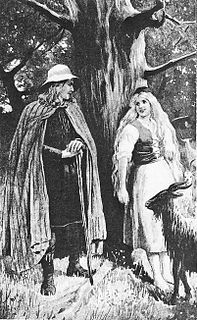
Incest is found in folklore and mythology in many countries and cultures in the world.
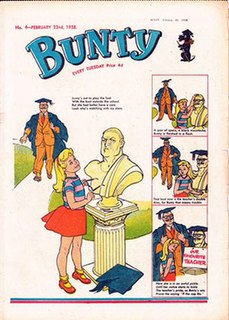
Bunty was a British comic for girls published by D. C. Thomson & Co. from 1958 to 2001. It consisted of a collection of many small strips, the stories typically being three to five pages long. In contrast to earlier and contemporary comics, it was aimed primarily at working-class readers under the age of 14, and contained mostly fictional stories. Well-known regular strips from Bunty include The Four Marys, Bunty — A Girl Like You, Moira Kent, Lorna Drake, Luv, Lisa, The Comp, and Penny's Place.
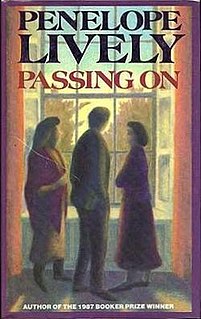
Passing On is a novel written by Penelope Lively and published in 1989. It tells the sensitive and intimate story of how a brother and sister’s lives change after their imperious mother dies. The story is set in the South of England in the late eighties.

Madea's Big Happy Family is a 2011 American comedy-drama film based on Tyler Perry's 2010 play of the same name, the 11th film in the Tyler Perry film franchise, and the sixth in the Madea cinematic universe. Tyler Perry reprised Madea and Joe, and the other cast members included Loretta Devine, Shad "Bow Wow" Moss, David Mann, Cassi Davis, Tamela Mann, Lauren London, Isaiah Mustafa, Natalie Desselle, Rodney Perry, and Shannon Kane. It tells the story of Madea finding out that her niece is dying from her cancer as she gathers her niece's children and their family members to deal with the news.
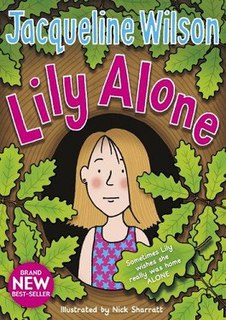
Lily Alone is a 2011 novel by best-selling author Jacqueline Wilson and illustrated by Nick Sharratt. It was first published in February of that year.

Peaches For Monsieur le Curé is a novel by the author Joanne Harris—retitled Peaches for Father Francis in the U.S.—and is the third in the series featuring Vianne Rocher. The first being, Chocolat and the second, The Lollipop Shoes. Set in 2010 France at the beginning of Ramadan, it is the tale of two communities, culturally different, but in many ways alike, and the woman who brings them together.

Tyler Perry's Madea's Tough Love is a 2015 direct-to-video animated comedy film directed by Frank Marino, written by Matt Fleckenstein and Benjamin Gluck produced by Tyler Perry, Matt Moore, and Ozzie Areu, and starring the voices of Perry, Cassi Davis, Rolonda Watts, Avery Kidd Waddell, Philip Anthony-Rodriguez, Georg Stanford Brown, Kevin Michael Richardson, Mari Williams, Indigo, Caitlyn Taylor Love, Maya Kay, Kate Higgins, and Bootsy Collins. It was released on January 20, 2015. While the film is mainly animated and serves as Tyler Perry Studios' first animated film, the beginning and ending scenes however are live-action like the other Madea films.

Joanne Cardsley is a fictional character from the British Channel 4 soap opera, Hollyoaks, played by Rachel Leskovac. The character made her first on-screen appearance on 17 September 2015. Joanne's arrival on-screen was not announced prior to broadcast. It was later reported she had joined the show as a regular cast member. Producer Bryan Kirkwood was glad to cast Leskovac because he admired her previous work as Natasha Blakeman on Coronation Street. Joanne is introduced as an old friend of Simone Loveday. She is characterised as an intelligent and successful solicitor but has a troubled personal life. Driven by loneliness she concocts schemes and behaves in a manipulative manner. The character made her final appearance on 5 December 2016 at the end of Leskovac's one-year contract.
Mirabelle is a children's book written by Astrid Lindgren.
Not Even My Name is the biography of Sano Halo, who survived the Greek genocide and moved to the United States of America. The book was written by Sano Halo's daughter, Thea Halo, and first published in 2000 by Picador, an imprint of Macmillan Publishers. The biography focuses on Sano Halo's experience during and immediately after the genocide. Not Even My Name was originally published in English in the US, but it has been translated into Dutch, Icelandic, and Greek.














